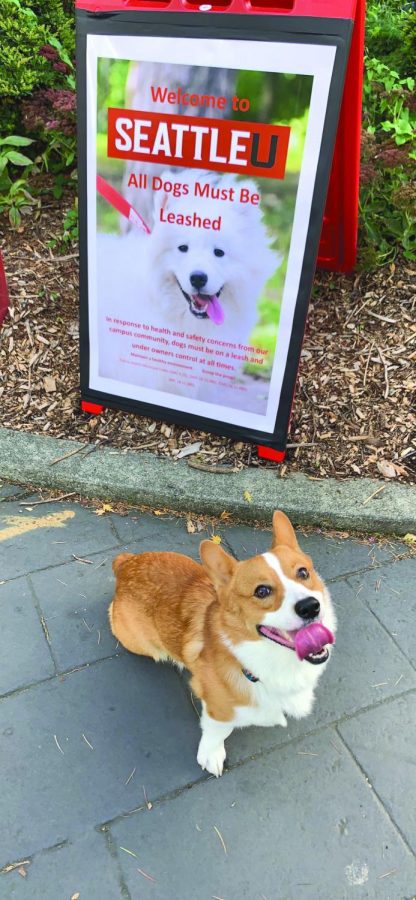Who Let the Dogs Off (Leash)?

Koda’s last moments of freedom before abiding by new leash laws.
If you’ve taken a walk around campus lately, there’s a good chance you’ve noticed a few signs posted at entrances announcing a new change to on-campus animal leash policies.
The Department of Public Safety announced an updated policy through a campus-wide email last Monday, Sep. 30. The new policy requires that pet owners have their dogs under leash control at all times while on campus, in contrast to the previous policy of Seattle University leash or voice-control.
The change is likely a surprise for most members of the community, as dogs have always had a considerable amount of freedom on campus.
The email acknowledged Seattle U’s history of openness and friendless towards dogs on campus but referenced recent cases of aggressive dog behavior, causing genuine concern for campus-wide health and safety.
“This policy is consistent with the City of Seattle’s leash laws,” the email stated. Seattle’s Municipal Code is very clear on requiring dogs to be leashed at all times in public—a policy Seattle U will now follow. “It is unlawful for the owner to permit any animal…to be at large or trespass upon the property of another,” according to Seattle Municipal Code. “’At large’ means a dog or other animal inside The City of Seattle, off the premises of the owner and not under control by a leash of eight feet in length or shorter.”
Craig Birklid, executive director of public safety and transportation, commented on specific reasons for this policy change. “We had a couple of serious injuries,” he said, “and then this summer we had, within a fairly quick succession, three individuals bitten by dogs.” He also referenced multiple reports of dogs fighting on campus.
Birklid said that the decision was based on a cumulative number of reports regarding dog owners’ lack of control over their animals and believed it to be a decision with the health and safety of the community in mind. Birklid added that the Union Green Dog and Baby Park will comply with the campus-wide policy change and will not be a leash-free area.
Birklid has received comments expressing frustration regarding the new policy, but he is confident that the community is supportive of the decision. “Some people are disappointed that they don’t have that space [Union Green] available to them, but they seem quite understanding,” Birklid said. “From the folks that I’ve had conversations and interacted with, they seem to have been pretty supportive.”
He believes that much of the problem derived from part of the previous leash policy, which allowed dogs to be under voice control in lieu of a leash. “The voice-control piece is where people didn’t quite understand what that meant, and they just thought that if they kept calling their dog, perhaps their dog would come to them, and that’s control,” Birklid said.
He also took time to explain how this will benefit students, faculty and staff with service animals, as unleashed dogs often harassed and distracted service animals from their duties. “It’s a fantastic change,” Senior Director for Disabilities Services Kim Thompson agreed.
Thompson referenced similar reports of health and safety concerns regarding unleashed dogs from students, faculty and staff with service animals on campus. Unleashed dogs regularly caused problems for students’ service animals and often made it more difficult for them to traverse campus.
“This will allow service animals to better perform their duties,” Thompson said. Thompson said that while this policy change meant a great deal to the community members her office represents, her office was not involved with the decision-making process but knew about it ahead of time and was aware of the planned changes.
Thompson also said that the Office of Disabilities Services regularly fielded complaints from students and others regarding unleashed dogs, agreeing that this policy change is a positive one.
“Our campus is not a dog park,” she said. “It was almost like the wild west before.”
Kristopher Shultz, assistant director of Disabilities Services, noted that the campus has no designated areas for large or small dogs. It would be impossible on a college campus, and he referenced multiple complaints from students with service animals.
Shultz offered examples of certain circumstances where service animals would be exempt from this policy, should their tasks require them to be unleashed.
“An example of that would be if a service animal needed to alert a community member of their handler’s location in case of an emergency,” he said. Additionally, the Disabilities Services office does not anticipate this change affecting emotional service animals.
Erick may be reached at elake@su-spectator.com

